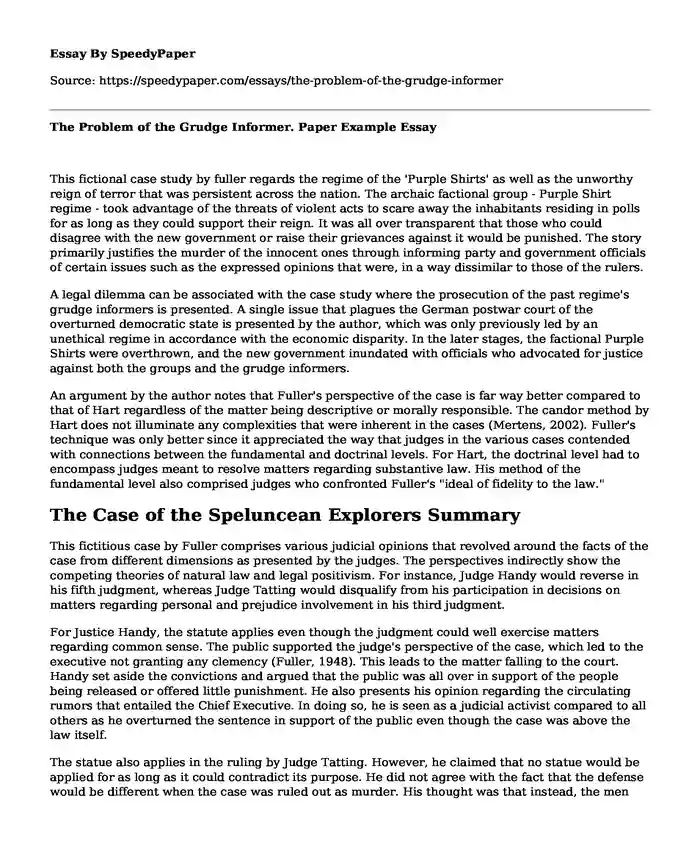
| Type of paper: | Essay |
| Categories: | Fiction Terrorism Government |
| Pages: | 3 |
| Wordcount: | 636 words |
This fictional case study by fuller regards the regime of the 'Purple Shirts' as well as the unworthy reign of terror that was persistent across the nation. The archaic factional group - Purple Shirt regime - took advantage of the threats of violent acts to scare away the inhabitants residing in polls for as long as they could support their reign. It was all over transparent that those who could disagree with the new government or raise their grievances against it would be punished. The story primarily justifies the murder of the innocent ones through informing party and government officials of certain issues such as the expressed opinions that were, in a way dissimilar to those of the rulers.
A legal dilemma can be associated with the case study where the prosecution of the past regime's grudge informers is presented. A single issue that plagues the German postwar court of the overturned democratic state is presented by the author, which was only previously led by an unethical regime in accordance with the economic disparity. In the later stages, the factional Purple Shirts were overthrown, and the new government inundated with officials who advocated for justice against both the groups and the grudge informers.
An argument by the author notes that Fuller's perspective of the case is far way better compared to that of Hart regardless of the matter being descriptive or morally responsible. The candor method by Hart does not illuminate any complexities that were inherent in the cases (Mertens, 2002). Fuller's technique was only better since it appreciated the way that judges in the various cases contended with connections between the fundamental and doctrinal levels. For Hart, the doctrinal level had to encompass judges meant to resolve matters regarding substantive law. His method of the fundamental level also comprised judges who confronted Fuller's "ideal of fidelity to the law."
The Case of the Speluncean Explorers Summary
This fictitious case by Fuller comprises various judicial opinions that revolved around the facts of the case from different dimensions as presented by the judges. The perspectives indirectly show the competing theories of natural law and legal positivism. For instance, Judge Handy would reverse in his fifth judgment, whereas Judge Tatting would disqualify from his participation in decisions on matters regarding personal and prejudice involvement in his third judgment.
For Justice Handy, the statute applies even though the judgment could well exercise matters regarding common sense. The public supported the judge's perspective of the case, which led to the executive not granting any clemency (Fuller, 1948). This leads to the matter falling to the court. Handy set aside the convictions and argued that the public was all over in support of the people being released or offered little punishment. He also presents his opinion regarding the circulating rumors that entailed the Chief Executive. In doing so, he is seen as a judicial activist compared to all others as he overturned the sentence in support of the public even though the case was above the law itself.
The statue also applies in the ruling by Judge Tatting. However, he claimed that no statue would be applied for as long as it could contradict its purpose. He did not agree with the fact that the defense would be different when the case was ruled out as murder. His thought was that instead, the men could 'eat' their fellow men if the act would end up being ruled out as murder (Fuller, 1948). It was a matter of living with himself depending on his capacity to affirm to the case. However, his actions would determine the result, which would most probably be evil, the reason why he recuses.
References
Mertens, T. (2002). Radbruch and Hart on the grudge informer: A reconsideration. Ratio Juris, 15(2), 186-205.
Fuller, L. L. (1948). The case of the speluncean explorers. Harvard Law Review, 62, 616.
Cite this page
The Problem of the Grudge Informer. Paper Example. (2023, Feb 14). Retrieved from https://speedypaper.net/essays/the-problem-of-the-grudge-informer
Request Removal
If you are the original author of this essay and no longer wish to have it published on the SpeedyPaper website, please click below to request its removal:
- Socialization Definition Essay Samples
- Essay Sample for Free: Nursing Research on Fatique
- Free Essay Example on Schooling and Society
- The Case of the Wondering Eyes - Free Essay on Medical Ethics
- Free Essay with the Case Study of Flinder and Tools Available
- Consumer Data Privacy in the Time of Big Data Analytics
- Essay Example on Benefits for Not Building the Border Wall
Popular categories




